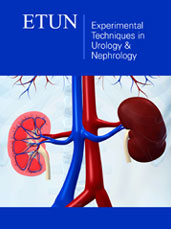- Submissions

Abstract
Experimental Techniques in Urology & Nephrology
Loin Pain and Haematuria Syndrome (LPHS) Linked to Symptomatic Nephroptosis (SN) and Revealing Pedicle Stretch Causing Neuro-Ischaemia Using the New IVU 7 Sign
-
Open or Close Salma A Ghanem1, Khalid A Ghanem2, Nisha Pindoria3 and Ahmed N Ghanem4*
1Royal London Hospital, London
2Mansoura University Hospital, Egypt
3North Middlesex University Hospital, London
4Retired Consultant Urologist, Egypt
*Corresponding author: Ahmed N Ghanem, MD, FRCS, Retired Consultant Urologist, No1 President Mubarak Street, Mansoura 35511, Egypt
Submission: July 27, 2017; Published: October 02, 2017

ISSN: 2578-0395 Volume1 Issue1
Abstract
Introduction and objectives This article is based on a prospective 10 years observational study on loin pain haematuria syndrome (LPHS) complicating symptomatic nephroptosis (SN) and the results of renal sympathetic denervation and nephropexy (RSD&N) surgery. The objective here is to demonstrate that renal pedicle stretch causes neuro-ischaemia as evidenced by the new IVU 7 sign.
Patients and methods: All patients presenting with loin pain with or without hematuria during 10 years were entered into a prospective observational study and underwent thorough clinical, laboratory and imaging investigations. Repeated standard imaging was invariably normal, when supine. However, 190 patients demonstrated SN of > 1.5 vertebrae on repeating intravenous urography (IVU) with erect film. Of whom 36 (18.9%) patients developed recurrent episodes of painful hematuria for which no organic pathology was detected on all imaging, when supine- thus fitting the definition of LPHS. The IVU 7 sign, with its horizontal and vertical segments, represents the renal pedicle at supine and erect IVU films, respectively was used for measuring renal pedicle stretch causing renal ischaemia.
Results: Results of 190 with SN on IVU-E, 182 were females and 8 males. The mean age was 28.8; duration of symptoms 15.7 and hospital follow up 6.6 years. Patients showed no abnormality on IVU or ancillary imaging when supine. All patients showed renal drop of >1.5 vertebrae (>5cm) on erect IVU film. Other demonstrable pathology on erect IVP film included: pelviuretric junction kink affecting the right kidney in 116 (61.1%) and bilateral in 19 (10%) of patients. Stretch/rotation of renal pedicle causing neuro-ischaemic pain of LPHS was demonstrable on the right side in 72 (37.9%) and bilaterally in 7 patients.
Complications of SN on IVU erect film included both obstructive and neuro-ischaemic: obstructive complication included ballooned renal pelvis, hydronephrosis and upper pole diverticulum. Neuro-schaemic complications induced by pedicle stretch and rotation/twist were haematuria of the LPHS affecting 36 (18.9%), auto nephropexy affecting 12 right kidneys, upper pole calyctiasis with extra-vasation affecting 28 (15.8%) right kidney and 2 bilateral that are best shown on RGP. Renal atrophy affected 4 right kidneys. Upper pole infarction affected 2 kidneys. Retrograde pyelography (RGP) also demonstrated upper pole calyctiasis with extra-vasation. Surgical treatment was used in 28 patients; 10 had simple nephropexy and 18 had RSD&N for severe LPHS. Four of patients treated with simple nephropexy had recurrence of LPHS while those who had RSD&N were all cured.
Conclusion: Upright IVU film and RGP are essential for the diagnosis of SN complicating into LPHS. The new IVU 7 sign affirms that pedicle stretch causes ischaemic nephropathy. Renal sympathetic denervation and nephropexy is curable for LPHS but simple nephropexy is not.
Keywords: LPHS; Nephroptosis; Obstruction; Ischemia; Neuropathy; Autonephropexy; Auto-nephrectomy; Sympathetic nephroplegia; Renal sympathetic denervation; Nephropexy
Abbreviations: LPHS: Loin Pain Haematuria Syndrome; SN: Symptomatic Nephroptosis; RSD&N: Renal Sympathetic Denervation and Nephropexy; RGP: Retrograde Pyelography; IVU: Intravenous Urography; SN: Symptomatic Nephroptosis; LP: Loin Pain; UTI: Urinary Tract Infections; PUJ: Pelvi- Ureteric Junction; PC: Pelvicalyceal Dilatation; RGP: Retrograde Pyelography; IR: Isotope Renography; RGP: Retrograde Pyelography; ER: Emergency Room; BMI: Body Mass Index; OPD: Out-Patient Department; MASS: Multiple Associated Splanchnic Symptoms; GIT: Gastro-Intestinal Tract; APD: Acid Peptic Disease; IBS: Irritable Bowel Syndrome
 a Creative Commons Attribution 4.0 International License. Based on a work at www.crimsonpublishers.com.
Best viewed in
a Creative Commons Attribution 4.0 International License. Based on a work at www.crimsonpublishers.com.
Best viewed in 







.jpg)






























 Editorial Board Registrations
Editorial Board Registrations Submit your Article
Submit your Article Refer a Friend
Refer a Friend Advertise With Us
Advertise With Us
.jpg)






.jpg)














.bmp)
.jpg)
.png)
.jpg)










.jpg)






.png)

.png)



.png)






